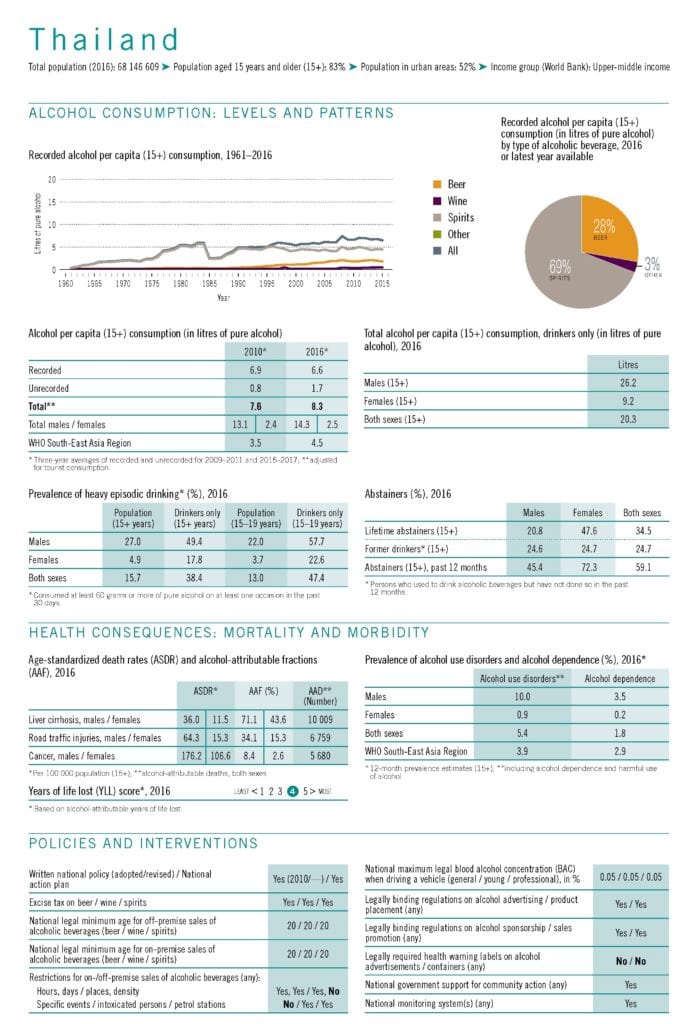Communities in Thailand are campaigning to improve the 2008 Alcohol Beverages Control Act. A group of civil society including Stop Drink Network, a Movendi International member organization, submitted proposed amendments to the Act. These amendments delivered to House Speaker Chuan Leekpai are backed by 100,000 eligible voters in the country. They include the following:
- A ban on alcohol companies using product logos in advertisements and corporate social responsibility (CSR) campaigns.
- Lowering the legal blood alcohol concentration level for driving under the influence of alcohol and raising penalties against businesses found to be selling or serving alcohol to people under the influence of alcohol.
- More robust legal action for vendors who sell alcohol to children and youth below the 20 year legal age limit for alcohol use.
Thailand currently has a modern and evidence-based alcohol policy system that many countries learn from and adapt. But the alcohol industry is exploiting the loopholes in the law to maximize profits. Since direct alcohol advertising is banned alcohol companies are using CSR projects as a promotional platform to build a positive brand image that would lead to higher sales.
The 2008 Alcoholic Beverages Control Act needs to be updated to keep pace with the new tactics employed by alcohol companies to exploit legal loopholes to peddle alcohol through indirect campaigns,” said Teera Watcharapranee, the manager of the Stop Drink Network, as per Bangkok Post.
Teera Watcharapranee, manager, Stop Drink Network
Big Alcohol campaign to destroy one of the world’s best alcohol laws
There are countless examples of how alcohol industry CSR organizations undermine science, shift blame to consumers, obstruct or undermine public health oriented alcohol policy making and use philanthropic activity to promote positive brand images. All this serves to build a smokescreen around the direct and fundamental conflict of interest inherent in any Big Alcohol involvement in health and development initiatives.
In fact, in Thailand Big Alcohol is pushing for the destrcution of the proven and successful Thai Alcohol Act, by lobbying for another set of amendments to the Act. Their proposed amendments include:
- Destroying the alcohol advertising ban,
- Instituting the sale of alcohol around the clock, and
- Disbanding the alcohol sales ban near educational institutions.
All of these industry amendments are in direct contradiction to evidence-based solutions recommended by the World Health Organization.
This further illustrates that the alcohol industry should not have any place in public health policy making due to their obvious conflict of interest.
Alcohol policy in Thailand
The WHO country mission has praised Thailand for their alcohol policies. The country is in a region of the world that is seeing the biggest increases of alcohol use due to aggressive global alcohol corporations entering countries in South-East Asia in the race to convert alcohol abstainers to consumers. Thailand’s alcohol use has also been rising but much slower due to the effective and scientifically proven alcohol laws.
But still, the country is affected by a heavy alcohol burden.
- Thailand ranks among the top for years of life lost due to alcohol.
- Alcohol-related cancer kills more than 5,500 people.
- Alcohol-related road traffic injuries kill almost 7,000 people.
- Liver cirrhosis kills more than 10,000 people in Thailand.
- Per capita alcohol consumption among users is more than 20 liters, for males it is more than 26 liters.
- More than half of young Thai males between the ages of 15 to 19 years are engaging in binge alcohol consumption.
Thailand’s alcohol policy model consists of the WHO alcohol policy best buy solutions:
- The alcohol tax is earmarked to be reinvested in alcohol prevention and control and health promotion activities;
- The legal age limit and other alcohol availability regulations are better than in many other countries in the region and around the world;
- And alcohol marketing is also comprehensively regulated.
The Thai government has been committed to preventing and reducing alcohol harm further in the country and implementing recommendations by the WHO.
